九年级人教版Unit6 SectionB(1a-2c)
人9英U2-Section B (1a~2e)
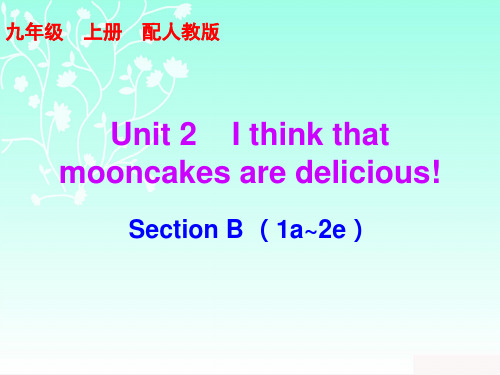
A. go
B. to go
C. going
D. went
( C )3. The boats take different routes, but they all ________ in the same place.
A. give up
B. clear up
C. end up
D. make up
【4】not only … but also … 的用法 【教材例句】 Not only do people spread them around in different hiding places for an egg hunt, but they also give out these treats as gifts. 人们不仅会把 鸡蛋分散地藏在不同的地方来玩寻蛋游戏,而且还会 把它们作为礼物分发出去。(教材第16页) 【用法】 not only … but also … 意为“不但……而且 ……”,连接两个并列成分,当引导的并列短语作主语 时,谓语动词要遵循就近原则。 当not only … but also … 分别连接句子,且not only位于句首时,其后 的主谓结构要部分倒装。
( C )1. There are some dangerous fishes in this river, and I’ve warned Jack ________ here.
A. swim not to
B. to not swim
C. not to swim
D. to swim not
( C )2. I wanted to do my homework last night, but ended up ________ to the cinema.
九年级英语全一册同步训练Unit 6 Section B(1a-1e)(含答案)

Section B(1a-1e)知能演练提升一、根据句意及首字母或汉语提示完成单词1.I don’t like that apple because it’s too (酸的).2.The supermarket is usually crowded with lots of c on weekends.3.Jane likes (酥脆的) cookies. They are dry, hard and easily broken.4.I don’t like chocolate because it tastes too s.5.Don’t add too much salt in the soup, or it will be too s.二、单项选择1.The girl thought she was not , so she didn’t eat breakfast every day.A.thin enoughB.enough thinC.heavy enoughD.enough heavy2., the boy finished his homework with the help of his sister.A.At the end ofB.At the lastC.In the endD.By the end3.—Who potato chips by?—By George Crum.A.did; inventB.was; inventedC.were; inventedD.are; invented4.—I couldn’t find my ruler anywhere.—Don’t worry. Maybe someone took it .A.make mistakesB.make a mistakeC.by mistakeD.for mistake★三、补全对话,有两项多余A:Hi, Danny! What is this in English?B:Oh, it’s a key.A:What’s it made of?B:It’s made of metal.A:1.B:It’s used for opening and locking a door.A:I see. That’s interesting. Can I have a try?B:Yes, please.A:Look, it works. By the way, what’s that over there?B:You may have a guess.A:It looks strange, neither like a bike nor a plane. 2.B:It was invented by my father. You may call it a plike.A:3.B:Yesterday morning.A:What’s it used for?B:It’s used for riding or flying.A:4.B:You can ride it like a bike. As you ride faster and faster, it can fly like a plane. A:That sounds interesting. I think your father is great!B:I think so. 5.知能演练·提升一、1.sour2.customers3.crispy4.sweet5.salty二、1.A2.C3.C4.C三、1.C2.D3.A4.F5.E。
人教版英语九年级全一册教案:Unit6 SectionA(1a-2d)
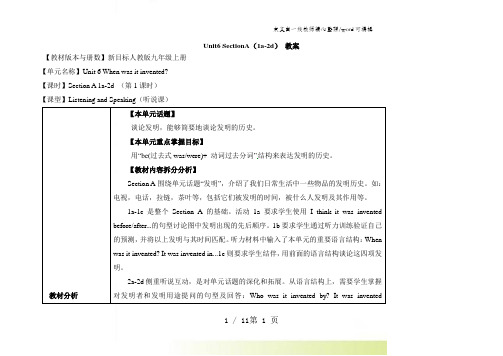
Unit6 SectionA(1a-2d)教案【教材版本与册数】新目标人教版九年级上册【单元名称】Unit 6 When was it invented?【课时】Section A 1a-2d (第1课时)【课型】Listening and Speaking(听说课)教材分析【本单元话题】谈论发明,能够简要地谈论发明的历史。
【本单元重点掌握目标】用“be(过去式was/were)+ 动词过去分词”结构来表达发明的历史。
【教材内容拆分分析】Section A围绕单元话题“发明”,介绍了我们日常生活中一些物品的发明历史。
如:电视,电话,拉链,茶叶等,包括它们被发明的时间,被什么人发明及其作用等。
1a-1c是整个Section A的基础。
活动1a要求学生使用I think it was invented before/after...的句型讨论图中发明出现的先后顺序。
1b要求学生通过听力训练验证自己的预测,并将以上发明与其时间匹配。
听力材料中输入了本单元的重要语言结构:When was it invented? It was invented in...1c则要求学生结伴,用前面的语言结构谈论这四项发明。
2a-2d侧重听说互动,是对单元话题的深化和拓展。
从语言结构上,需要学生掌握对发明者和发明用途提问的句型及回答:Who was it invented by? It was invented1 / 11第 1 页by...What was/is it used for...? It was/is used for...从活动和内容上看,2a要求学生听对话谈论三项发明,并按所听顺序为其排序;2b需要学生听懂发明的用途,补全表格。
2c 要求学生结伴谈论听力中的发明用途。
2d作为示范性对话,介绍了生活中随处可见的小发明-拉链。
【通过本单元的学习学生需掌握哪些综合技能】通过本单元的学习使学生学会谈论各种发明的历史,熟练使用被动语态。
人教版新课标英语九年级上Unit6

九年级(上)Unit 6“When wa it invented”教学设计石羔中学吴秀云一、教材依据本课是新目标英语九年级册上第6单元的SectionA 1a-2c。
二、设计思想1.指导思想:新课程理念突出“以人为本”,重视学生能力的培养。
强调外语教学不仅要向学生传授语言知识,更要注重培养学生的语言技能,重视学生的情感和态度,激发学生的学习兴趣,培养学生的学习自信心,最终实现学用结合的目标2.教材分析:此套教材集合了美式英语的特点也融入了中国的教学理念,着重于文化背景知识和学习策略等部分,增加了任务型学习成份和语篇输入。
本单元的话题为谈论常见物品的发明时间。
围绕“常见物品的发明时间” 使学生学会被动语态句型。
3.设计理念:本节课结合教材的实际对教材内容、编排顺序等进行了调整、替换、删掉和补充。
在整个教学过程中,尽量用英语进行教学,为学生创造外语氛围。
利用课件,增加直观性,激发学生学习兴趣,降低学习难度,突破重难点且提高课堂密度。
让学生在“自主、合作、探究”的氛围中进行讨论与运用,促进语言表达能力的提高和情感、态度及价值观的升华。
三、教学目标1.知识与技能(1)使全体学生掌握本节课的重点词汇和基本了解被动语态在英汉两语中的用法区别。
(2)使80%的学生能用本节课的重点词汇和句型简单的对话;(3)使60%的学生能充分运用本节课的重点词汇和句型表达自己的观点,并能灵活运用英语进行听、说、读、写等活动。
2.过程与方法(1)多媒体辅助教学法(2)交际法:(3)坚持以学生为中心,采用individua wor和ath hean coudn't afford afford a TV becaue the were rea eine I came to ee me at wee5I thin ou need to tae tae a hitor ca四、总结(引深探究 15分钟)v发明;创造invent 指发明创造出自然界本来不存在的东西,如工具、方法、手段、汽车、电器、合成材料等。
九年级全一册Unit6SectionB1a2e听说课优质课课件

Who invented them? 2. 在听力练习中,能够准确判断句子正误,完成句子填 空,能听懂薯片发明的历史以及发明的过程等。 3.在口语交际中能够使用一般过去时的被动语态谈论薯 片的发明过程和历史。
New words
crispy adj. 脆的;酥脆的 [ˈkrɪspi]
人教新目标版 九年级(全)
Unit 6 When was it invented ?
Section B 1a-1e
听说课优质课
1.学习本课新词汇: crispy, salty, sour, by mistake, customer 掌握句型:
—Did you know potato chips were invented by mistake?
3、in the end 最后,终于 (相当于finally 或 at last)
【拓展】 at the end of可以指时间,也可指处所,意为“在……尽头,在……结束时” 。 by the end常和of相连,用于指时间,意为“到……底(末)为止”
And the customer loved them and asked for more. He told the other customers about them, and soon everyone was ordering thinly cut, crispy, salty potato chips.
lazi chicken 辣子鸡 hot pot火锅
They are hot (辣的).
Different food has different taste(味道).
salted
eggs
人教版英语九年级上册Unit6SectionA1a--1c说课稿教案与反思

Unit6Whenwasitinvented?投我以桃,报之以李。
《诗经·大雅·抑》原创不容易,【关注】,不迷路!SectionA(1a-1c)说课稿一、教材分析1.教材的地位和作用我今天说课的内容是人教版新目标英语《Go for it》九年级第6单元“When was it invented?”SectionA1a--1c。
本单元涉及内容是本书当中比较重要的一部分。
被动语态结构及运用是教学中一个难点和重点,也是学生比较不容易理解的部分,因为它是建立在各种时态之上的。
另外通过对我们经常使用的发明物的历史来开阔眼界,丰富学生的阅历,使学生养成勤于思考,善于总结的好习惯。
本课时主要任务是:让学生在原有现在时和含情态动词的被动语态基础之上进一步了解过去时的被动语态并逐渐理解其他不同时态的被动语态,它是由主动语态向被动语态的过渡,更是学生掌握被动语态及其所关联的其他时态被动语态的结构及运用的关键。
另外本课所涉及的情感教育,于现实十分的有用,它通过发明物为线索讲述了中国古代四大发明,教师可因势利导,激发学生的爱国热情,培养学生对科学技术创新的浓厚兴趣,形成积极的学习态度,同时促进语言实际运用能力的提高。
二、学情分析(一)新课程标准规定,九年能级学生要完成分级目标的五级标准,即有较明确的英语学习动机和积极主动的学习态度,能听懂教师有关熟悉话题的陈述,能就日常生活的各种话题与他人交换信息。
依据目标,我应用任务型教学,采取如下教法:1.听录音听音是英语学习的重要方法,也是课堂教学的重要步骤。
在听中可以感知,可以模仿。
2.重点解释在教学中,对学生遇到的困难和模糊的地方进行解释,有效发展学生的综合语言运用能力和知识的准确性。
3.情景对话通过对话逐步达到对教材内容的全部操练。
在对话时可不受课文内容和顺序的限制,师生完全可以根据当时的实际思路创造性地交流,这种教法是实现语言知识向语言能力转变的必经之路。
Unit6 第3课时 Section B (1a-2c)
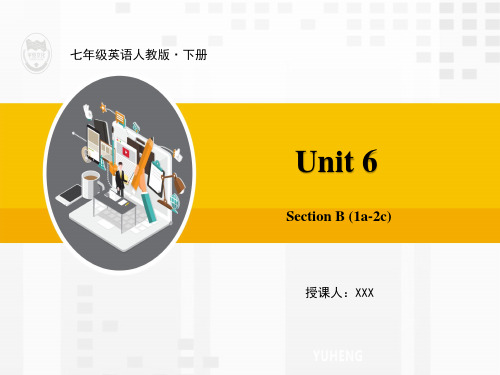
二、新课讲解
2. …so it’s like any other night for Zhu Hui and his host family. ······因 此这像是另一个朱辉和他的寄宿家庭的夜晚。
any other + 名词单数形式, 意为“(除了某个以外) 其他的任何一个”。 如:Jack is like any other boy of his age.
and aunt
are making zongzi
二、新课讲解
Places
New York
Time
9:00 p.m.
the mother the father Zhuhui
is reading a story to her young children is watching a soccer game on TV is talking on the phone to his cousin in Shenzhen
三、归纳小结
七年级英语人教版·下册
Unit 6
Section B (1a-2c)
授课人:XXX
一、新课引入
What can you do in these places?
pool
supermarket
shop
二、新课讲解
1a Look at the pictures. Complete the chart.
school library
shopping playing basketball
reading
二、新课讲解
Listen again. Check your answers in 1c.
1e Use the information in the chart to make a conversation.
Unit 6 Section A (1a-2d)同步练习 21—22学年人教版九年级全册
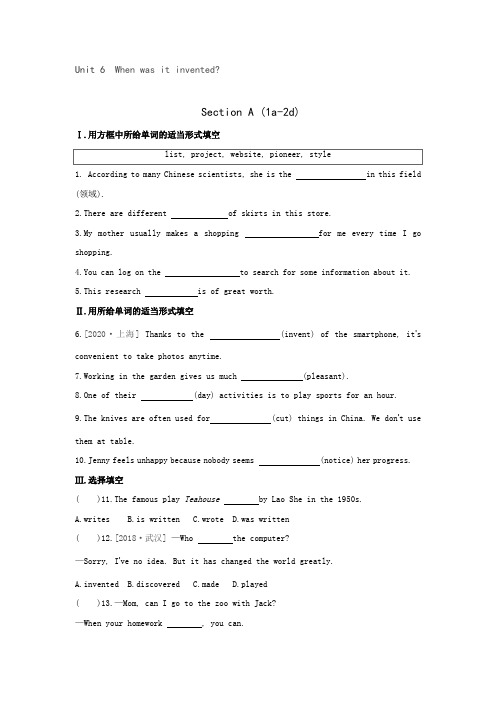
Unit 6 When was it invented?Section A (1a-2d)Ⅰ.用方框中所给单词的适当形式填空1.According to many Chinese scientists, she is the in this field (领域).2.There are different of skirts in this store.3.My mother usually makes a shopping for me every time I go shopping.4.You can log on the to search for some information about it.5.This research is of great worth.Ⅱ.用所给单词的适当形式填空6.[2020·上海] Thanks to the (invent) of the smartphone, it's convenient to take photos anytime.7.Working in the garden gives us much (pleasant).8.One of their (day) activities is to play sports for an hour.9.The knives are often used for (cut) things in China. We don't use them at table.10.Jenny feels unhappy because nobody seems (notice) her progress. Ⅲ.选择填空( )11.The famous play Teahouse by Lao She in the 1950s.A.writesB.is writtenC.wroteD.was written( )12.[2018·武汉]—Who the computer?—Sorry, I've no idea. But it has changed the world greatly.A.inventedB.discoveredC.madeD.played( )13.—Mom, can I go to the zoo with Jack?—When your homework , you can.A.is doneB.was doneC.doesD.did( )14.[2020·孝感] —Helen, could you please water the flowers in my garden?— . They are so lovely.A.That 's too badB.With pleasureC.You 're welcomeD.I 'm afraid not( )st year, five Chinese teachers to a school in the UK to teachthe British students Chinese.A.was sentB.were sentC.have sentD.sent( )16.—Thank you very much for giving me some advice on how to deal with stress.— .A.That 's trueB.Don 't mention itC.OK. I 'll tryD.I don 't think so( )17.—Did you go to the party last night?—No. I .A.didn 't inviteB.wasn 't invitedC.haven 't invitedD.isn 't invited( )18. —He always appears to .—That 's because he 's really knowledge-able and experienced.A. make an effortB. have a pointC. pull togetherD. take place( )19.The Three Gorges Dam produces for millions of people in China.A.electricityB.influenceC.transportD.technology( )20.We all know that America was by Columbus while the electric lampwas by Edison.A.invented; discoveredB.discovered; inventedC.created; inventedD.found; discoveredⅣ.情景运用电话是人类历史上一项伟大的发明,请根据以下图文,写出五个完整、正确的句子。
人教版九年级英语全册导学案(完美版)
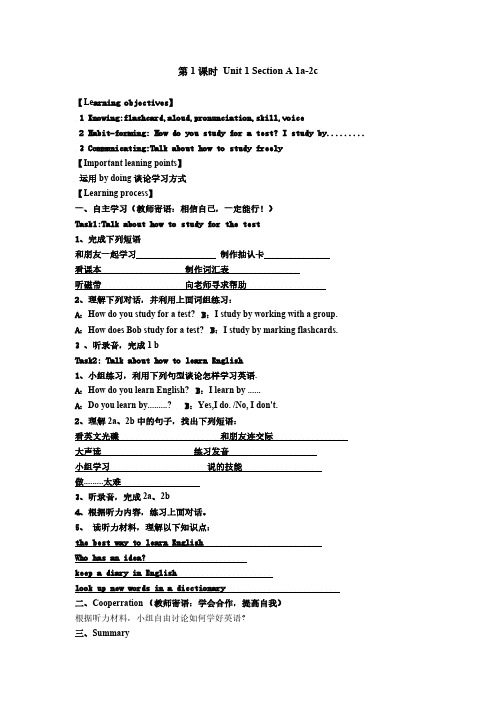
2、理解 2a、2b 中的句子,找出下列短语:
看英文光碟
和朋友连交际
大声读
练习发音
小组学习
说的技能
做.........太难
3、听录音,完成 2a、2b
4、根据听力内容,练习上面对话。
5、 读听力材料,理解以下知识点:
the best way to learn English
Who has an idea?
1、完成下列短语
和朋友一起学习
制作抽认卡
看课本
制作词汇表
听磁带
向老师寻求帮助
2、理解下列对话,并利用上面词组练习:
A:How do you study for a test? Bห้องสมุดไป่ตู้I study by working with a group.
A:How does Bob study for a test? B:I study by marking flashcards.
a fun way to do... mak mistakes in... municating: Role play the listening conversation 【Learning process】 一、自主学习 Task1: Talk about your problems in learning English. 1、读 1a 中的句子,正确译出下列短语的汉语意思.
keep a diary in English
look up new words in a dicctionary
二、Cooperration (教师寄语:学会合作,提高自我)
根据听力材料,小组自由讨论如何学好英语?
三、Summary
根据下面的句子,总结 by 的用法和含义:
新人教版九年级英语 unit6 Section B-1-优质课件.ppt
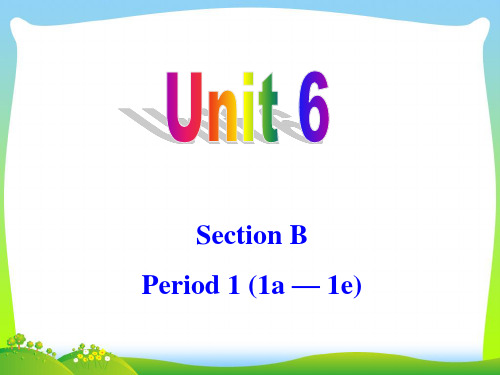
4. The customer said they were not salty T F enough.
5. George wanted to make the customer T F
happy. 6. The customer was happy in the end. T F
Listen again and answer the questions.
you will have to find another job. make such silly mistakes any more
/ make such a silly mistake any more
【2013湖北黄石】Ⅵyour bag __b_y__m_i_s_ta_k_e__ .
D. by mistake
解析:by accident意为“偶然地”,by
mistake意为“错误地”,by the way“顺便提
一下”。本句意为“很抱歉我昨天错拿了你
的雨伞,这是那把雨伞”。
【2012江苏无锡】完成句子 别再犯如此愚蠢的错误了,否则你只能另谋
高就了。 Don’t _____________________________, or
The idea came to him by accident. 很偶然地他想到了这个主意。
I’m sorry to take your umbrella ___D____
yesterday; here’s the umbrella.
A. by accident
B. by the way
C. by guess
单项选择
1. -Sorry, I took your umbrella _B_____ mistake.
新目标英语九年级Section B(1a-2c)
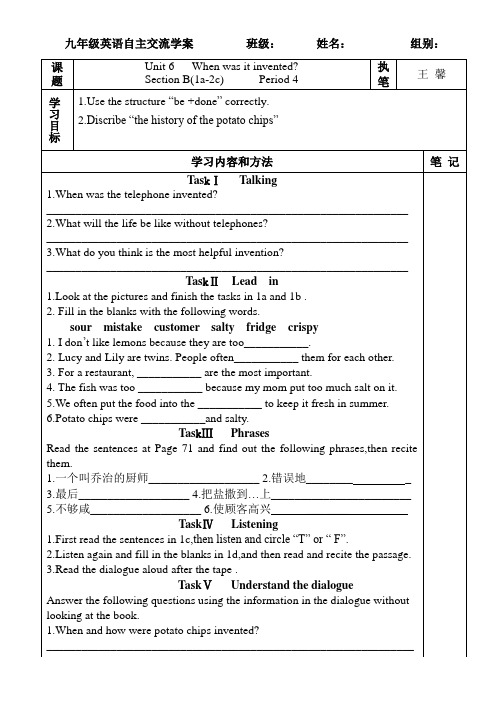
_______________________________________________________________
九年级英语自主交流学案班级:姓名:组别:
2.Who were they invented by? What was his job?
_______________________________________________________________
3.Why did the customer send the potatoes back to the kitchen?
_______________________________________________________________
1. I don’t like lemons because they are too___________.
2. Lucy and Lily are twins. People often___________ them for each other.
3. For a restaurant, ___________ are the most important.
笔记
TaskⅠTalking1.When was the源自telephone invented?
______________________________________________________________
2.What will the life be like without telephones?
3.Read the dialogue aloud after the tape .
人教版九年级英语全一册Unit 6 Section A (1a-2d) 课件
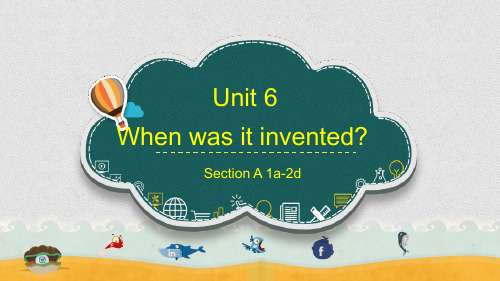
daily have a point
website pioneer
list
mention
adj. 每日的;日常的 有道理
Do you know?
What are the Four Great Inventions in ancient China?
Amazing Chinese inventions
paper-making printing compass gunpowder
造纸术
印刷术 指南针 火药
Amazing inventions
3 前两个数字不为零,后两个数字为零。
1800 1900
eighteen hundred nineteen hundred
2 千年的读法
2000 two thousand 2001 two thousand and one
4 非四位数的年份的读法!
531 five hundred and thirty-one
Listen and complete the conversation. Alice: Was your life very _d_i_f_fi_c_u_lt_ when you were a kid?
Grandma: Oh, _n_o_t_r_e_a_ll_y. Why? Alice: Well, you didn’t have modern
★invent 意为“发明”, 指发明以前不存在的东西。 Do you know who invented the computer? 你知道谁发明的电脑吗?
★find 意为“找到, 发现”, 指偶然发现或几乎没有困难地发现。
I found some old photos in that drawer. 我在那个抽屉里发现了一些旧照片。
Unit 6 It’s raining!1
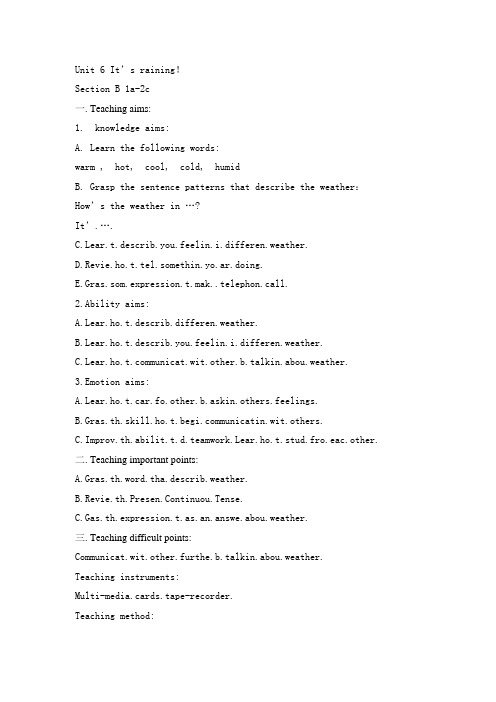
Unit 6 It’s raining!Section B 1a-2c一. Teaching aims:1. knowledge aims:A. Learn the following words:warm , hot, cool, cold, humidB. Grasp the sentence patterns that describe the weather:How’s the weather in …?It’.….C.Lear.t.describ.you.feelin.i.differen.weather.D.Revie.ho.t.tel.somethin.yo.ar.doing.E.Gras.som.expression.t.mak..telephon.call.2.Ability aims:A.Lear.ho.t.describ.differen.weather.B.Lear.ho.t.describ.you.feelin.i.differen.weather.municat.wit.other.b.talkin.abou.weather.3.Emotion aims:A.Lear.ho.t.car.fo.other.b.askin.others.feelings.municatin.wit.others.C.Improv.th.abilit.t.d.teamwork.Lear.ho.t.stud.fro.eac.other.二. Teaching important points:A.Gras.th.word.tha.describ.weather.B.Revie.th.Presen.Continuou.Tense.C.Gas.th.expression.t.as.an.answe.abou.weather.三. Teaching difficult points:Communicat.wit.other.furthe.b.talkin.abou.weather.Teaching instruments:Multi-media.cards.tape-recorder.Teaching method:nguag.Teaching.四. Teaching steps:Step I、Warming-UpT: I’m very happy to have a lesson with you. Do you like playing a game?Ss: Yes.T: OK. Let’s play a game.Whe..sho.thi.an.ask.“How’.i.going?.I.yo.hav.thi.picture.Pleas.stan.u.an.sa.“Great/Prett.good/No.to.bad/Terrible.”.(Students play the game with the teacher. )T:I’ll ask one of you to come here and play the game with others. Step II、Leading-InT: I think all of you like playing games. Do you like watching TV?Ss: Yes.T:OK. Let me play a TV show for you.(Students watch the TV show)T: What’s the man doing?S: He’s reporting weather.T: Yes. This is a weather report and we can learn something about weather from a weather report. Do you want to know the weather in China today?Ss: Yes.T: Let’s look at a map of China. According to the map. Let’s ask and answer in chains. How’s the weather in Shanghai?S1: It’s raining. How’s the weather in ……?S2: It’s ……. How’s the weather in ……?S3:It’s…….Step III、Presenting the new wordsT: How’s the weather in Beijing?Ss: It’s sunny.T: Yes, it’s sunny.And we can also say it’s warm.Because it’s spring now.Let’s look at a picture of spring.Read after me.It’s spring.It’s warm.Students read after the teacher.It’s spring. It’s warm.It’s summer. It’s hot.It’s autumn. It’s cool.It’s winter. It’s cold.It’s Chengdu. It’s humid.Now look at this picture.It’s spring. How’s the weather in this picture?S: It’s warm/cold/humid/hot/cool.T:Have you remembered these words? Let’s check if you have remembered these words. How’s the weather in Picture A.S: It’s……Students ask and answer questions about the weather in the picture. Step IV、ListeningT: All of you have done very well. We have a friend called Maria. She is in Mexico now. She’s calling her friend Sam. Let’s listen to the tape. Try to fill in the chart on Page34.(Then teacher checks the students’answers. )Ste.V.Finis.th.task.Task One.Role play a conversation between Maria and Sam.Task Two.Make up a conversation between you and your best friend.Task Three.Step V、HomeworkCal.you.friend.o.you.relative.afte.class. Mak.the.happ.b.greetin.them.。
初中英语 人教版新目标 九年级 sectionb 1a-2cPPT课件
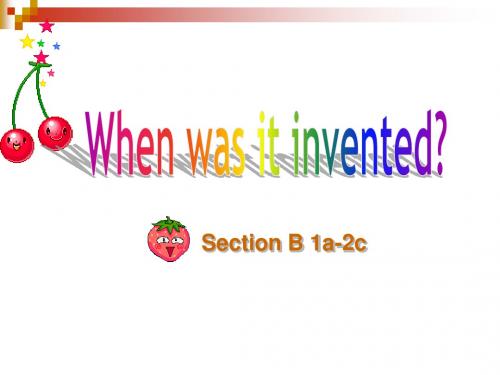
2. Which food is sour? 3.Which food is sweet?
4.Which food is bitter?
5.Which food is salty ? 6.Which food is hot ?
pepper onion
Listen and circle “T” (for true) or “F” (for false).
Section B 1a-2c
salty:
咸的,含盐的. 名词,salty 加 y 构成形容词. 最后,终于. eg. Everything will be all right in the end. 弄错的,错误地. eg. He took the umbrella by mistake.
in the end:
crispy salty
sour sweet
sweet
sweet
Write the name of a different food after each word. sweet sour
salty
crispy
Tastes
1.Can you tell me five tastes?
Sour orange apple tea salt coffee pizza sweet yogurt banana bitter hot salty
potato n ----- pl. potatoes
negro. hero. tomato. potato(英雄黑人喜欢吃西红柿和土豆) in the end 指经过许多变化,困难和捉摸不顶的情况才发生. at last 往往用于经过一番周折后才到来,往往带有较浓厚 的感情色彩. finally 用来引出一系列事物的最后一项内容. They talked and talked about where to go and stayed at home in the end. At last I passed the examination. I spoke at the meeting finally.
九年级Unit6 When was it invented? 听说课教学设计
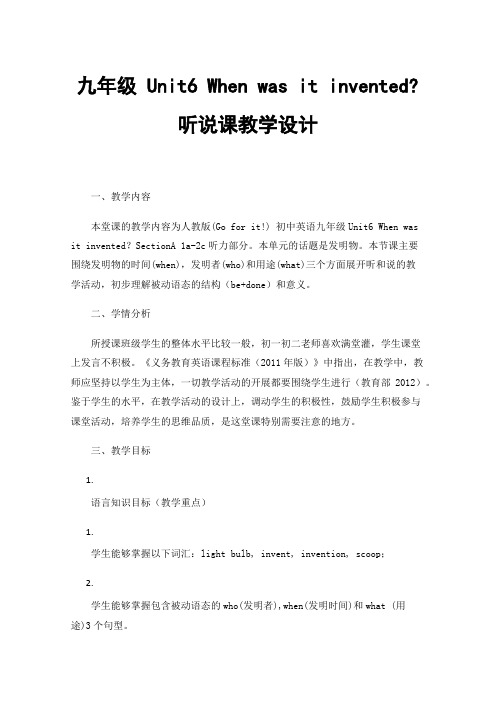
九年级 Unit6 When was it invented?听说课教学设计一、教学内容本堂课的教学内容为人教版(Go for it!) 初中英语九年级Unit6 When wasit invented?SectionA 1a-2c听力部分。
本单元的话题是发明物。
本节课主要围绕发明物的时间(when),发明者(who)和用途(what)三个方面展开听和说的教学活动,初步理解被动语态的结构(be+done)和意义。
二、学情分析所授课班级学生的整体水平比较一般,初一初二老师喜欢满堂灌,学生课堂上发言不积极。
《义务教育英语课程标准(2011年版)》中指出,在教学中,教师应坚持以学生为主体,一切教学活动的开展都要围绕学生进行(教育部2012)。
鉴于学生的水平,在教学活动的设计上,调动学生的积极性,鼓励学生积极参与课堂活动,培养学生的思维品质,是这堂课特别需要注意的地方。
三、教学目标1.语言知识目标(教学重点)1.学生能够掌握以下词汇:light bulb, invent, invention, scoop;2.学生能够掌握包含被动语态的who(发明者),when(发明时间)和what (用途)3个句型。
1.语言技能目标(教学难点)通过本节课的学习,学生能用被动语态从3个方面口头介绍日常生活中的一项发明,并加以改进,变成一个实用且有创意的发明。
1.情感目标培养学生小组合作竞争意识,增强团队合作精神;在享受发明给我们带来便利的同时,设计一个有创意的发明,培养学生创新意识。
四、教学过程Step 1:Lead in.Watch a short video about 4 inventions by Doraemon. Introduce the topic from 3 aspects: inventor(who), time(when) and usage(what).【设计说明】哆啦A梦是学生非常熟悉的动画片。
Section B(1a-2c) 课件人教版新目标
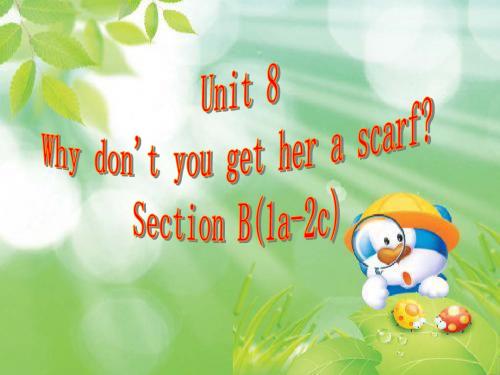
根据首字母完成对话。 A: It's Anna's b___________ next week. What should I get f __________ her? B: W _______don't you get her a s _________ ball? She likes to play soccer. A: No, that's not creative e___________. B: How a __________a photo of your family? A: Yeah, she'll like i_________.
A: Cats are the most popular pets. B: Parrots are the most unusual pets.
PAIRWORK What do you think is the best pet for these people? Fill in the chart. Then talk about your own choices.
学习目标:
New words: spider, mouse, snake, hamster, turtle, child Key phrases: not sure, good pet, the most unusual, not friendly enough, easy to take care of, too scary, too…to, a 6- year-old child
Listen and number the pets in the order you hear them. Write the numbers on the lines in the chart.
- 1、下载文档前请自行甄别文档内容的完整性,平台不提供额外的编辑、内容补充、找答案等附加服务。
- 2、"仅部分预览"的文档,不可在线预览部分如存在完整性等问题,可反馈申请退款(可完整预览的文档不适用该条件!)。
- 3、如文档侵犯您的权益,请联系客服反馈,我们会尽快为您处理(人工客服工作时间:9:00-18:30)。
Unit 6 I like music that I can dance toSection B(1a-2c)学习目标:1.扎实掌握Section B (1a-2c) 的词汇和句型并能灵活运用。
2.通过自主学习,听力与口头练习,能运用所学谈论自己喜欢的事情。
3.培养学生热爱生活的道德情操。
激情投入,享受学习的快乐。
重点:学会描述自己喜欢的电影。
难点:在交际中恰当运用定语从句。
课前预习案I. 教材助读一、听力预测(一)牢记单词,扫清听力障碍。
(二)阅读听力要求和问题(或者看图)预测听力内容,以便听对话或短文时做到有的放矢。
Please write down the names of your favorite band, book and movies.II.词汇精粹学习建议:仔细阅读听力题,找出重点单词、短语和句型。
在听力材料中勾画出单词、短语、句型和交际用语,并结合语境猜测其含义。
words:1.sink _________过去式________过去分词_________phrases:1.sinking ship2.scary monsters答案:words:1. 下沉sank sunkphrases:1.正在下沉的船2.可怕的巨舰III.我的疑惑请你将预习中未能解决的问题和有疑惑的问题写下来,等待课堂上与老师和同学探究解决。
课内探究案导入新课Have a class report. Let several students talk about their favorite band, book and movies.T: What is your favorite band?S1: The lion.T: Why do you like it ?S1: Because…T: What’s your favorite movie?S2: …Ⅰ.洗耳运动1. Listen to the tape and finish: 2a 2b 。
2a: 答案:1. a jacket 2. a book 3. a movie poster 2b: 答案:2. Answer the questions:⑴What does the book tell about?⑵Where did Michael get the M onster Lizard?⑶Does Michael love movies that are about monsters?答案:⑴It tells about how to become a good player.⑵His brother gave it to him.⑶Y es, he does.Ⅱ.角色表演教学建议:老师给学生较充分的时间思考,让学生自由展示,给学生提供一个引发他们的想象力,灵活用语言表达自己思想的平台。
注意:本部分没有固定答案,让学生自由发表观点。
学习建议:疯狂朗读对话,熟练掌握如何描述自己的表达方式。
然后两人一组分角色表演对话。
Pair work: 仿照例句进行对话。
E.g.---A. What kind of book do you like?---B . I like book that tells about sports.---A. Why do you like it?---B. I like it because I like sports.……..III.质疑探究学习建议:分析所给例句,根据提示总结重难点单词,短语和句型的用法。
一、重点单词短语1. unusual Adj. 不寻常的⑴He likes clothes that are unusual .他喜欢不同寻常的衣服。
⑵Snow is an unusual sight in this warm place.下雪在这个温暖的地方是一种罕见的景象。
思考:⑴unusual的反义词是___________, 加un前缀构成的反义词还有哪些?___________________________⑵用a/ an 填空:_______ usual day _______ unusual day答案:⑴usual; unimportant/ unfair/ unhappy⑵a; an【即时练习】1. 翻译:某种不寻常的事正要发生。
答案:Something unusual was about to happen.点拨:注意unusual修饰不定代词时要后置。
二、重难点句子1.I like movies that are sad.I like movies that have scary monsters.思考:⑴两个句子的划线部分在句中作什么成分?_____________________________________________⑵句中that在定语从句中做什么成分?__________________________________________答案:⑴定语。
⑵that引导定语从句且在定语从句中作主语。
2. He likes writers who explain things well.思考:⑴who 引导________从句,who的先行词是___________.⑵Who explain things well.为什么用explain而不用explains?_______________________________________________ 答案:⑴定语;writers。
⑵当引导词在定语从句中作主语时,定语从句中的谓语动词的单复数由先行词决定,因为先行词是writers, 故用explain而不用explains。
教学建议即时练习应该在探究完问题后马上完成。
教师给出答案以及必要的点拨。
【即时练习】1.I like movies that ______ sad.A. isB. areC. wasD. were2. Some students ______ are clever are also studying hard.A. whichB. whomC. whoD. whose答案:1. B. 点拨:本题考查引导词在定语从句中作主语谓语动词的单复数由先行词决定,先行词是movies,故用are.2. C. 点拨:先行词是students,引导词在定语从句中作主语故用who,而不用whom.IV. 学贵有疑—我思考,我收获——通过以上学习,请你把尚存的疑问写下来,与同学进一步探究。
V. 学以致用,拓展提升运用本节课所学语言现象及重点句型编写对话,询问对方所喜欢的电影,衣服或者演员。
提示问题:Teacher : I like listening to music and I spend most ofspare time on music.1.Do you have any hobbies?2.Do you like music, reading books, watching moviesor any other?3.What is your favorite kind of music, books ormovies?4.Can you introduce your favorites and tell us why ?以小组为单位编制对话,小组内必须人人参与。
Ⅵ.总结反刍学习建议:回扣本节课的内容重点单词、短语、句型、语法及听力技巧方面进行二次领会和记忆。
课堂总结:组织学生进行一对一互查,内容是:听力和语法中的句型背诵。
课堂评价Ⅶ.我的收获——反思静悟、体验成功——请写出本堂课学习中,你认为感悟最深的一至两条收获。
1._____________________________________2. _________________________________________ Ⅷ.课后学习指导1.牢记Section B(1a-2c)单词和短语,运用所学谈论自己的爱好。
2.预习并完成Section B(3a-4)预习案。
课后训练案基础训练题——把最简单的事做好就叫不简单!I .词汇A.根据首字母和英文释义填入一个恰当的单词或词组1.p to choose one thing or action rather than another; like better2.l: the words of a song, esp. a modern popular song3. g: kind and ready to help others; light; low4. r:to make sb. remember sb. or sth.5. d :likely to tell a lie or cheat; not honest答案:1. prefer 2. lyric 3. gentle 4. remind of 5. dishonestB.根据汉语提示完成句子6.What does it _________ you _________(想起)?7.It’s the kind of music________________(你能够随着跳舞的).8.She likes musicians________________(写自己的歌词).9.This is the most delicious food ________________(我曾吃过的)10.She likes singers________________(很清楚地唱出歌词的).11.I only eat food ________________(尝起来好的).12.I like groups________________(穿着真正酷的衣服).13.I listened to________________(一首名为Heart Strings的歌).14.________________(坦白地讲),I also want to stay healthy.15.I prefer ________________(不愿吃) too much fried food.答案:6. remind, of7. (that) you can dance to 8. who write their own lyrics 9. that I have ever had 10. who sing the words clearly 11. that tastes good 12. that wear really cool clothes13. a song called Heart Strings 14. To be honest 15.not to eatⅡ.单项选择16.The music is great because you can dance _________it.()A. toB. onC. forD. in17.Never eat food that stays overnight,_________ it tastes _________.()A. if; goodB. but; wellC. even though; goodD. even if; well18.Eating well and _________ can keep you _________.()A. more exercise; healthyB. exercising more; healthC. exercising more; healthyD. more exercise; health19.The music is great because you can sing along _________it.()A. onB. forC. inD. with20.I prefer pieces of music that _________great lyrics.()A. haveB. hasC. there isD. there are21.Time is up, please _________.()A. wake up herB. wake her upC. wake upD. woke up22. Oil will _________,how can we do it?()A. use in B use fromC. use upD. use of23._________,I don’t like the way he talks with others.()A. To my honestB. Speaking honestC. In honest wayD. To be honest24.Don’t be _________, granny; I can help you.()A .worriedB. worryC. worry aboutD. worried about25.If I were you, I would _________ electricity. It is dangerous.()A.stay away fromB.keep far fromC.stay awayD.keep from答案:16.A to在此处的意思与with 相同。
